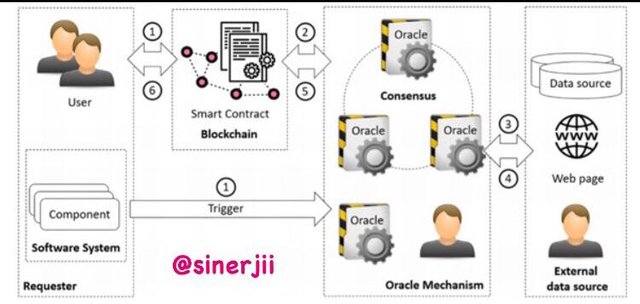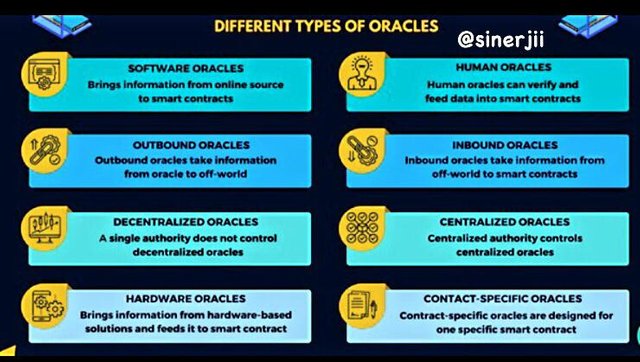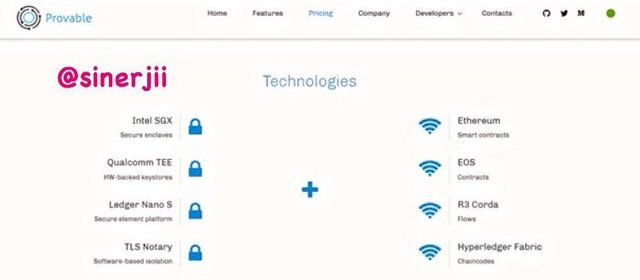Steemit Crypto Academy Season 3: Week 7 Homework (by @allbert) | Blockchain Oracle
Hello Steemit Crypto Academy,
Professor @allbert handled the essential homework topics of this week. I will try to explain the questions in the homework in detail. Thank you, Professor, for working on this issue. I learned a lot of new information.

Source: Canva

Introduction
Smart contracts need to obtain data about real-world situations and events from outside the blockchain system. Data streams were needed to overcome this limitation with smart contracts. These data feeds are known as oracles. Oracles help increase trust in the Blockchain. Although it has some disadvantages, the use of oracles is widespread.
I was intrigued by the Provable example for blockchain oracle. Provable is integrated with several blockchain protocols and its service is convenient and accessible for non-blockchain applications. Provable is constantly reviewing new public blockchain protocols and considering further blockchain integration. There are lots of technology parts of Provable. Thank you, Professor, for looking into this different issue.

Before going on to answer the questions, I would like to explain what Blockchain Oracle is. Blockchain oracles are third-party services that provide external information to smart contracts. They act as a bridge between blockchains and the outside world. Oracles are of great importance within the blockchain ecosystem because they expand the workspace of smart contracts. Without blockchain oracles, the uses of smart contracts are minimal.
1- History and Description. Does it have any token or cryptocurrency associated? Explain.
-What is Blockchain Oracle?
For the Blockchain to be implemented in real life, some applications are needed. For this reason, the "blockchain oracle" was needed. Blockchain oracles are intermediaries that receive information from the outside world. Blockchain is quite reliable, but oracles eliminate the possibility of failure in any blockchain-based system.
The Blockchain is a decentralized, immutable digital ledger that keeps transaction data in a large network of nodes. Blockchain can disrupt existing business models and infrastructure in many industries by providing a platform for decentralized trust in data.
As the number of people with technical knowledge increases, the risk also increases. In this context, blockchain exchanges and platforms have also been increasingly attacked. These attacks resulted in losses of hundreds of millions of dollars. The use of Blockchain is expanding day by day. In this context, increasing risks need to be prevented. Blockchain-based systems must be reliable.
A blockchain oracle is a mechanism that incorporates data from the outside world into a blockchain system. Blockchain oracles are usually off-chain components, so the reliability properties of blockchains do not apply to them.
Figure 1. Blockchain oracle mechanism architecture diagram.
A central oracle is controlled by a single entity and is the sole information provider for the smart contract. Using only one source of information can be risky. The effectiveness of the contract is entirely dependent on the organization controlling the oracle.
Decentralized oracles share some of the public targets and avoid counterparty risk. They increase the reliability of the information provided to smart contracts by not relying on a single source of truth. The other Types of Blockchain Oracle;
Figure 2. Different Types of Oracles
In summary, many applications built on the Blockchain need to interact with other external systems. Blockchain oracles provide necessary data from external systems to the Blockchain.
-An Example: Provable
Provable (formerly known as Oraclize) is a pioneering oracle service founded in 2015. Provable's primary purpose is to ensure the availability of verifiable and auditable off-chain computational archives.
Provable is the leading oracle service for smart contracts and blockchain applications, serving thousands of requests every day on platforms like Ethereum, Rootstock, R3 Corda, Hyperledger Fabric, and EOS.
The need for an oracle, which provides data to the blockchain field, is increasing. The need for data transfer has created oracle. But trusting a new broker is not easy. One solution is to create a decentralized oracle system, but its reliability is a matter of debate.
Figure 3. Homepage of Provable
The solution developed by Provable is to show that the data from the original data source is original and unmodified. This is accomplished by accompanying the transferred data with a document called proof of authenticity. Proofs of authenticity can be built on different technologies such as auditable virtual machines and Trusted Execution Environments.
Provable solves the Oracle Problem elegantly. Accordingly, Blockchain Application developers and users of such applications do not have to rely on Provable. They continue to maintain their security model. Also, data providers do not need to change their services to be compatible with blockchain protocols. Smart contracts can access data directly from websites or APIs.
Provable is integrated with several blockchain protocols and its service is convenient and accessible for non-blockchain applications. In addition, Provable Engine provides services for both blockchain-based and non-blockchain-based applications. The flexibility of Provable allows the engine to be used in many different ways and contexts, even outside of the blockchain context.
Provable is constantly reviewing new public blockchain protocols and considering further blockchain integration. There are lots of technology parts of Provable.
Figure 4. Provable Technologies

2- Functionalities and real-life applications.
Oracles securely and reliably send real-world data to smart contracts running on blockchain technology.
We can see blockchain oracles in many real-life applications. If we give an example of real-life; For instance, if you are buying a house with cryptocurrency, a simple smart contract can be drafted for sale. He would say something like “If person A sends the necessary money to person B, the title deed of the house is transferred from person B to person A”. Once the conditions of the smart contract are met, the transaction is executed irreversibly. There is no need to rely on traditional third parties to initiate or execute the contract.
Thanks to Oracle, the information transferred to the Blockchain can represent almost anything, from asset price fluctuations to weather conditions and evidence of successful payments.

3- Pros and Cons.
Using the Oracle Blockchain Platform to build and manage your blockchain network has many advantages over other blockchain products.
Pros;
- Oracle Blockchain Platform includes all the dependencies needed to support a blockchain network: compute, storage, containers, identity services, event services, and management services.
- Oracle Blockchain Platform includes the blockchain network console to support integrated transactions. This helps you get started with app development in minutes and allows you to complete a proof of concept in days or weeks rather than months.
- Oracles can connect the Blockchain to an external data feed.
- Oracles are also able to connect the Blockchain to external databases.
Cons;
All oracles use methods to reduce the risk of misinformation being used on the Blockchain. However, data sources can always be a common cause of failure.
- There is a demand for a weather forecast for a particular day for a region or city. Multiple oracles will search the internet for resources for a weather forecast and return it to the requestor. For example, if the weather forecast for Istanbul is predicted by the Bureau of Meteorology and all sources come from it, bad sensors or reports will affect all sources. The result obtained by Oracle will still be valid from an operational point of view, but the reliability of the prophecies in sending accurate data will be affected. Therefore, data collected from multiple web service data sources may sometimes not give the correct result.
- Also, since Oracles are not part of the main blockchain consensus, they are not part of blockchains' security mechanisms. The trust issue between third-party oracles and the non-trusted implementation of smart contracts is still unresolved.
- There may also be cases where a malicious person modifies the data by gaining access to the oracle and the contract flow.
- When receiving data from an Oracle, the Smart Contract is dependent on the accuracy of the information provided. This could potentially jeopardize the benefits of decentralization.
- The need for reassurance reappears when the correct behavior of a third party is adhered to. Because this necessary trust can only be of a cognitive nature, users can rely on research, due diligence, and even legal protection before using Oracles. As a result, the efficiency of interaction is hampered and there is no point in using a decentralized network.

4- Future developments and new projects
Oracle's plans for its blockchain platform are very extensive. Chief among these is providing development and integration support between wider Hyperledger Fabric networks and other blockchain technologies.
Oracle has announced that its platform will migrate to Hyperledger Fabric v2.x in the first half of 2021. Accordingly, it predicts that this version will bring all the core capabilities inherent in it.
It's also aimed at low-code development to do more "heavy lifting" around famous use cases, among its future goals. Such a move firmly adheres to Oracle's "blockchain facilitation" mentality, providing more "legs" for developers and further aiding applications that leverage blockchain capabilities.
Oracle also plans to expand its blockchain network support capabilities beyond enterprise boundaries and into the ecosystem realm by bringing additional governance, simplified deployment, and cross-ecosystem monitoring capabilities.
Oracle needs to be more careful in a post-COVID, high-risk innovation environment. In this context, blockchain startups need to articulate individual corporate benefits now more sharply than ever before.

Conclusion
Blockchain oracles are a crucial component in expanding blockchain capacity. It can be safely said that decentralized oracles are more reliable than centralized oracle mechanisms. Provable is integrated with some blockchain protocols and its service is convenient and accessible for non-blockchain applications. Also, there are several advantages and disadvantages of the oracle system. The system needs to concentrate on the disadvantages and reduce these disadvantages.
CC:
@allbert




This content appears to be plagiarised as indicated by @allbert
If you have not already done so, you should head to the newcomers community and complete the newcomer achievement programme. Not only will you earn money through upvotes, you will learn about content etiquette;
Notification to community administrators and moderators:
@steemcurator01 ADMIN
@steemcurator02 MOD
@sapwood MOD Professor[Advanced]